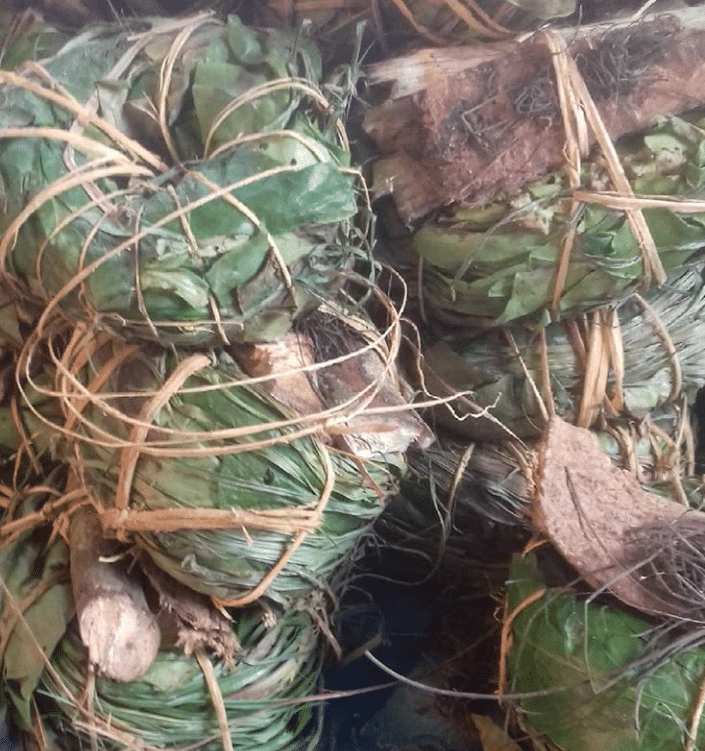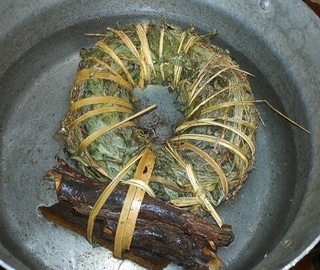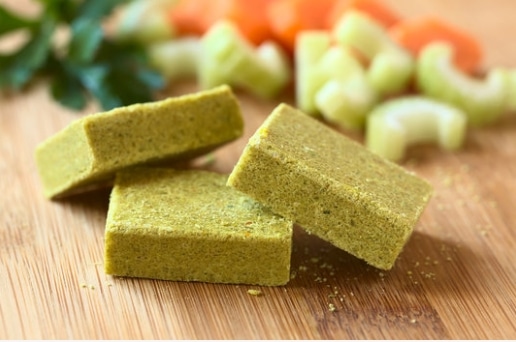Aju Mbaise is a herb containing the bark, leaves, and roots from 5 different plants, including ginger, uda (Negro pepper), and uziza. It is used in the production of pepper soup or other types of concoctions and is taken for its many health benefits. Aju Mbaise means “wrap from Mbaise.” Mbaise is a village in Imo state where the herb originated from and is now being consumed all around the country because of how beneficial it is. The herb is commonly consumed by new mothers and for women who want to slim down. That is why these days, Aju Mbaise is commonly packed in the form of a “slim tea” product for those looking for a way to get their weight down. [1]
Aju Mbaise comes in the form of wrapped leaves that have been bound together with some short sticks in the tie. All of that is part of the herb, and they all have their own distinct benefits. It is boiled in water that way, without it being unwrapped. Some other ingredients may also be added into the water to improve the taste. On its own, the water from Aju Mbaise herb has a bitter-sharp taste, due to the spices it contains, but the aroma is quite inviting. The water can be taken alone as a form of tea, or it can be used to cook. Although people who want quick results, like those who need it to slim down, would rather just drink the tea.

Nutritional and Phytochemical Properties of Aju Mbaise
A 2019 study was conducted to determine the phytochemical constituent of ethanol extract of Aju Mbaise herbal mixture. The study found out that the herbal decoction contains remarkable amount of phytochemicals. The phytochemical result discovered the presence of alkaloids (8.69%), flavonoids (19.10%), glycosides (6.86%), hydrogen cyanide (0.92%), phenols (31.56%), saponins (0.83%), steroids (0.94%), tannins (16.80%), and terpenoids (14.31%). [2]
In this article, we would be looking at some of the health benefits of Aju Mbaise, so you know what your gains from taking the herb.
1. Post-pregnancy Benefits
Aju Mbaise is commonly consumed by new mothers because of how it helps them recover from pregnancy. First, it helps them regain nutrients they may have lost during the period of pregnancy. It helps to reduce the size of the stomach, which had been bloated due to pregnancy, flattening it, and getting it down to its normal size. It also helps in the production of breast milk for the new mother as well as normalize and balance the menstrual cycle following delivery.
In fact, a 2016 medical study found out another possible health benefit of Aju Mbaise. The study results stated that the decoction inhibited the growth of negative bacteria in nursing mothers.
2. Weight Loss
Aju Mbaise is every effective in helping people lose weight, especially belly fat. This is because it splits fats into acids, making it easy to remove from the body. It also assists in metabolism, helping the body to burn fat the right way. This is beneficial to both women and men.
3. Balance Menstrual Cycle
Women facing irregularities in their menstrual cycle take Aju Mbaise to balance it and make their periods more predictable and regular, giving it a more even flow. It also makes the menstruation less painful for women who experience pain during menstruation.
4. Womb Flusher
Aju Mbaise is also taken by women to flush their wombs to get rid of the bad blood, water, and any other thing lodging in the womb after childbirth. Doing this also reduces the size of the womb, brings the stomach down. It is also used by women who have had miscarriages or abortions to flush their womb, make it healthy, and to prevent complications during future conceptions.
5. Tackle Fibroid and Tumor
Women also drink Aju Mbaise herb to tackle fibroid or a tumor that is in its early stage, to reduce the size and discomfort caused by the growth.
6. Fertility Potion
Aju Mbaise also increases fertility in women by opening their womb and cleansing it, making it safe and ready for pregnancy.

Side Effects of Aju Mbaise
The risks concerned with taking Aju Mbaise are minimal. Pregnant women are advised to stay clear of the herb because it increases the risks of miscarriage and also birth defects in babies. Nursing mothers should also limit their intake of the herb as it can affect the weight of the baby. Some common side-effects associated with the herb include light-headedness or dizziness when it is consumed too much. It also makes one hungry more. In all, the herb should be consumed in moderation.
YOU WILL ALSO READ…
- The Marvellous Health Benefits of Uziza
- 7 Epic Health Benefits Of Goron Tula
- 10 Common Nigerian Herbs and Their Health Benefits
- 10 Intriguing Health Benefits of Moringa Leaves
Collins Nwokolo is a human physiologist, writer and health enthusiast. He loves writing helpful articles on health and fitness, which he enjoys sharing with everyone.






